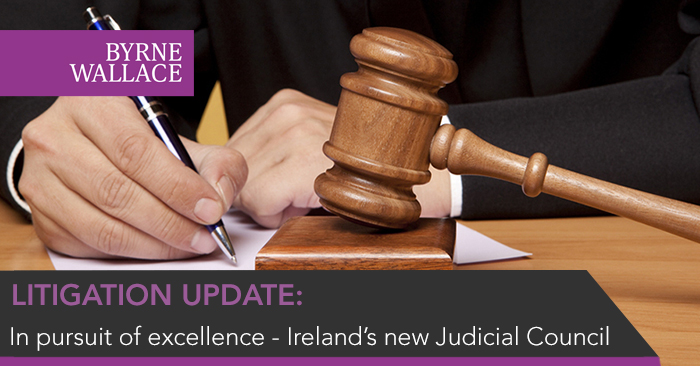In pursuit of excellence - Ireland’s new Judicial Council
Monday, 02 December 2019
The Judicial Council Act 2019 (the “Act”) was signed into law recently and contains many welcome innovations to modernise and regulate certain aspects of the judicial system in Ireland. The aim of the Act is to promote and maintain excellence in the exercise by judges of their judicial functions. The Council, which is made up of all the judges in the State, will establish a number of committees including the:
- Judicial Studies Committee: who will make it a statutory requirement for judges to undertake formal training for the first time. Under this regime, judges will be formally trained in “soft skills”, such as in the areas of implicit biases, the psychology of decision-making, the management of emotions, and workload management. Some other jurisdictions already have very extensive formal training processes for judges, who are treated as professionals in training in a separate vocation from the time they graduate from university.
- Personal Injuries Guidelines Committee: who in the face of rising insurance premiums, will compile guidelines for appropriate levels of damages for various types of personal injury. This Committee will be tasked with carrying out research on the levels of awards in neighbouring jurisdictions, which are often less than the levels of compensation payments in Ireland. These guidelines, when adopted will replace the Book of Quantum, which is the existing standard for quantifying personal injuries awards. The courts will have to have regard to the personal injury guidelines when assessing damages in personal injury cases, and where a judge departs from the guidelines he will have to provide reasons. This Committee will consist only of judges, which aligns with the practice in other jurisdictions such as England and Wales.
- Sentencing Guidelines and Information Committee: who will be tasked with preparing draft sentencing guidelines. The current criminal justice system suffers somewhat due to the variation in sentences imposed by judges from court to court. This is particularly so in different district courts, where the vast majority of criminal matters are heard. Under these new guidelines, a judge imposing a sentence must have regard to the relevant guidance unless satisfied that to do so “would be contrary to the interests of justice”. Where a judge does depart from the sentencing guidelines, the reasons will have to be stated in the decision.
- Judicial Support Committee: which will be set up for each court jurisdiction, made up of judges from the relevant court. These Committees shall advise and assist the Judicial Council in performing the functions under the Act as they apply to each court.
- Judicial Conduct Committee: which will be made up of eight judges and five additional “lay” people appointed by the Government. This disciplinary system will include the investigation of complaints against judges and the referral of matters for formal investigation. It also provides for reprimands to be issued against judges, each of which will be published in the Council’s annual report.
During his recent address and the opening of the new legal term, Chief Justice Frank Clarke advised that the Council would need a well-planned and well-resourced introduction. In particular, he highlighted the requirement for the designation of an establishment day from which each of the committees will begin their work. The reforms under the Act coincide with the Courts Service IT modernisation (including the introduction of e-filing as mentioned in Another First for ByrneWallace), which the Chief Justice also described a “generational chance to modernise how the public and practitioners interact with the courts”.
For further information or advice, please contact Helen Gibbons, Partner or any member of the ByrneWallace Litigation and Dispute Resolution Team.

